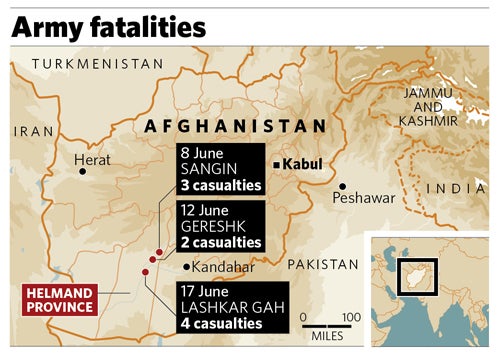First female soldier killed in Afghanistan

A 26-year-old female soldier became the first British servicewoman to be killed in Afghanistan when she and three SAS men died in a roadside bomb attack yesterday. Nine Britons have now lost their lives in the country in just 10 days.
Sarah Bryant, a member of the Intelligence Corps, and her three comrades died, and a fifth was injured, when the device exploded in Helmand province near their base at Lashkar Gar as they returned from an operation.
The deaths bring the total number of British losses in Afghanistan to 106. They came as Canadian Nato troops and Afghan government forces began a major offensive against resurgent Taliban fighters who had occupied villages in Arghandab, a few miles north of the country's second biggest city, Kandahar. Some of the insurgents were among more than 400 inmates who escaped from Sarposa jail in Kandahar last week.
The British soldiers were travelling in a Land Rover when a roadside bomb exploded at about 3.40pm local time. The vehicles have proved to be vulnerable to blasts and are in the process of being replaced by more heavily armoured vehicles. It was unclear last night why such a potentially risky means of transport was taken at a time of acute danger in Helmand.
Three soldiers were killed in the blast. One of the wounded died later at the British forces' main field hospital in Camp Bastion. The fifth soldier, although wounded, was left to call in an emergency helicopter while trying to administer first aid.
The female soldier, who is believed to be a Pashtu speaker, had been part of a team working with Afghan police 10 miles east of Lashkar Gar. She analysed intercepts of enemy radio communications, liaised with local people and searched women for weapons.
The number of British servicewomen killed in Afghanistan and Iraq now stands at seven. About 700 of the British force of just under 8,000 in Afghanistan are female. A number of those serving in Helmand and Kandahar are members of the Intelligence Corps and fluent in Pashtu, while others are based in Kabul with a proficiency in Dari, the language of the Tajiks and Uzbeks.
Three of the soldiers who died were members of the 23rd Special Air Service Regiment, one of two Territorial Army units attached to special forces. They had been coming towards the end of their six-month tour. Their main role had been to mentor Afghan security forces and go into operations alongside them.
Major Bruce Spencer, a spokesman for British forces based in Lashkar Gah, said: "It is absolutely tragic that we have lost so many people in such a short time. We have lost friends here. Our thoughts and prayers are with the families." But, he added, the campaign had to continue and British forces had an advantage. "The Taliban can't bring in the boreholes, the schools and the hospitals. These are the things we're using to engage with the people, and the people are the winners."
Gordon Brown said: "I would like to express my deepest condolences to the families of the four brave British soldiers who have lost their lives in Afghanistan and will be deeply mourned.
"They were in the most dangerous of jobs in the most difficult of circumstances. I salute not just their bravery, dedication and professionalism, but that of all our armed forces. Our troops are the best in the world and fighting for the noblest of causes."
The Defence Secretary Des Browne said: "We have now lost nine soldiers in 10 days and every single one of them is a tragedy."
*A Tory MP and former soldier, Adam Holloway, has broken ranks with the Conservative leadership by calling for the Government to talk to Taliban leaders. David Cameron, the Tory leader, gave his support to Mr Brown at Prime Minister's questions over the need to keep troops in Afghanistan. But Mr Holloway, a former Grenadier Guards officer who has visited Afghanistan on several occasions, said his view was that it was time to "make deals". "We have achieved our first objective – al-Qa'ida have no safe haven. The second is to deal with the Taliban. In specific local areas we need to make deals with local tribesmen. And who are the Taliban? They are the normal local tribesmen."
Subscribe to Independent Premium to bookmark this article
Want to bookmark your favourite articles and stories to read or reference later? Start your Independent Premium subscription today.

Join our commenting forum
Join thought-provoking conversations, follow other Independent readers and see their replies